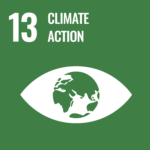The changing environment in the Mediterranean region

The Mediterranean region is a geographical characterised by high exposure and vulnerability of human societies and ecosystems to environmental changes because it cumulates environmental risks. These include strong warming (up to 6°C by 2100 under high-emission scenarios), projected drying trends, and accelerating sea-level rise (up to 80 cm by 2100 or more in some localities). Rapid urbanisation, increasing air and water pollution, and the impacts of mass tourism further exacerbate these risks. Ecosystems are under strain, with land degradation leading to the loss of over 50% of wetlands, overfishing putting 20% of fish species at risk of extinction by 2050, and non-sustainable agriculture practices contributing to habitat loss. The frequency and intensity of wildfires are also expected to increase, with some projections suggesting a doubling of the burnt area by 2100. The introduction of non-indigenous species, known as ‘tropicalization’, further threatens biodiversity. These interconnected factors strongly impact water resources, terrestrial and marine biodiversity, human health and security, with the most severe consequences in the southern and easter Mediterranean regions. The Mediterranean Basin and its people are under imminent threat of damages due to changing climate, increasing pollution, and the degradation of terrestrial and marine ecosystems.
Scientific context
There is substantial scientific knowledge on climate and environmental changes in the Mediterranean. Over the last decades, research has intensified through numerous focused studies and several large collaborative projects, such as MISTRALS, MedCLIVAR, CIRCE, and Med-Cordex. However, the findings are often not easily accessible to policymakers, stakeholders, and citizens.
 In 2015, a group of Mediterranean scientists and experts identified the need for a comprehensive assessment and synthesis of recent trends in the region. They emphasised the importance of understanding future developments and the consequences of environmental change on natural systems, the economy, and human well-being. This realisation motivated the creation of MedECC, an independent network of scientists dedicated to consolidating existing knowledge and making it accessible to policymakers and citizens.
In 2015, a group of Mediterranean scientists and experts identified the need for a comprehensive assessment and synthesis of recent trends in the region. They emphasised the importance of understanding future developments and the consequences of environmental change on natural systems, the economy, and human well-being. This realisation motivated the creation of MedECC, an independent network of scientists dedicated to consolidating existing knowledge and making it accessible to policymakers and citizens.
Political context
Regional political frameworks on these issues exist. The Mediterranean Action Plan (MAP), developed under the auspices of United Nations Environment Programme (UNEP) was adopted four decades ago in 1975, as the institutional framework for cooperation in addressing common challenges of marine environmental degradation. Under this framework, the Convention for the Protection of the Marine Environment and the Coastal Region of the Mediterranean (Barcelona Convention) and its seven protocols brings together the 21 Mediterranean riparian countries and the European Union, as Contracting Parties to the Barcelona Convention. The MAP-Barcelona Convention system is a legally-binding set of instruments, policies and action plans for addressing common issues and challenges of environmental degradation and protecting marine and coastal ecosystems of the Mediterranean Sea.
 MedECC materializes a regional Flagship Initiative of the Mediterranean Strategy for Sustainable Development (MSSD) 2016-2025, that identifies, under the Objective 4 “Addressing Climate Change as a Priority Issue for the Mediterranean”, the establishment of “a regional science-policy interface mechanism (…) with a view to preparing consolidated regional scientific assessments and guidance on climate change trends, impacts and adaptation and mitigation options”. This objective feeds into the Sustainable Development Goals (SDGs) 13 “Climate Action”.
MedECC materializes a regional Flagship Initiative of the Mediterranean Strategy for Sustainable Development (MSSD) 2016-2025, that identifies, under the Objective 4 “Addressing Climate Change as a Priority Issue for the Mediterranean”, the establishment of “a regional science-policy interface mechanism (…) with a view to preparing consolidated regional scientific assessments and guidance on climate change trends, impacts and adaptation and mitigation options”. This objective feeds into the Sustainable Development Goals (SDGs) 13 “Climate Action”.
The need of robust science-policy interfaces in the Mediterranean has also been stated in the Regional Climate Change Adaptation Framework for the Mediterranean Marine and Coastal Areas (UNEP/MAP) approved by the Contracting Parties to the Barcelona Convention in 2016.
During the first Union for the Mediterranean Ministerial Meeting on Environment and Climate Change in May 2014 in Athens (Greece) in theirs declarations the ministers expressed the need for a Mediterranean regional vulnerability assessment regarding climate change impacts.
History of MedECC
2015 – MedECC is launched as a volunteer initiative by scientists.
2017 – Plan Bleu and Union for the Mediterranean (UfM) sign the 1st collaboration convention to jointly support the MedECC for the 2018-2020 period.
2018 – The MedECC Scientific Secretariat, hosted by Plan Bleu, was established with funding from the Union for the Mediterranean, with support from the Swedish International Development Cooperation Agency (SIDA), and Plan Bleu.
2020 – The First Mediterranean Assessment Report (MAR1) and its Summary for Policymakers are published.
2020 – MedECC is awarded the 2020 North-South Prize of the Council of Europe.
2021 – The second partnership convention between the Plan Bleu and the Union for the Mediterranean is signed for the period 2021-2023.
2021 – The Summary for Policymakers of the First Mediterranean Assessment Report is recognised in the 2nd UfM Ministerial Declaration in Cairo (Egypt).
2021 – The Summary for Policymakers of the First Mediterranean Assessment Report is endorsed by the Contracting Parties to the Barcelona Convention during their 22nd meeting (COP22) in Antalya (Turkiye).
2022 – MedECC contributes to the Intergovernmental Panel on Climate Change’s (IPCC) Sixth Assessment Report (AR6) in a cross-chapter paper dedicated, for the first time, to the Mediterranean.
